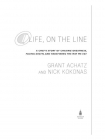Life, on the Line by Grant Achatz (leveled readers .TXT) 📗

- Author: Grant Achatz
Book online «Life, on the Line by Grant Achatz (leveled readers .TXT) 📗». Author Grant Achatz
Sunday night marked the most momentous paragraph in Alinea’s already famous story. Achatz, at age 34, won the James Beard Award—think Oscars for kitchen whizzes—as the top chef in the United States. This was another victory for the restaurant scene in Chicago—considered by many foodies as the most innovative and inventive dining city in the country. And it was remarkable affirmation for Achatz’s perseverance and pluck. Achatz is the third Chicago chef—after Charlie Trotter and Rick Bayless—to take home the prize.
And it’s safe to say he is the only one, in the history of the award, to have managed the feat after losing his sense of taste.
In June 2007, Achatz was diagnosed with stage IV tongue cancer. That’s as bad as it gets—there is no stage V. Several doctors told him the only way to deal with the disease would be to cut out three-quarters of his tongue. That has been the treatment protocol for four decades. His ability to speak properly would be compromised. His ability to swallow might disappear. And his ability to taste? It would be gone.
The man whom Gourmet editor Ruth Reichl credited with redefining the American restaurant decided to do the same for the treatment of tongue cancer. Achatz enrolled in a clinical trial at the University of Chicago that began with chemotherapy. Radiation followed. By October, his sense of taste had vanished. Still, he worked. He dreamed up new dishes. He experimented with ingredients. And he relied on his sous chefs to calibrate the flavors and finalize the balance of dishes he couldn’t taste.
Many people have firsthand knowledge of the physical and emotional struggle with cancer, particularly with an advanced cancer. We’d venture that many people who have never unfurled a napkin at Alinea are cheering Grant Achatz.
His cancer has not reappeared. His sense of taste is slowly recovering, though it may never completely return. His triumph—well, there are many ways to savor that.
“That’s amazing, right? And on the editorial page too. Top of the page.”
“Great.”
“Grant. This is not the food section. This is where the real news goes. That is a hugely inspirational piece.”
“Cool. Is that a big deal?”
I laughed to myself for a second and thought about it. “No. You know, Grant, relatively speaking, it’s not really a big deal at all. Go back to sleep. I’ll catch up to you later.”
“I’ll be at Alinea by noon.”
EPILOGUE
The James Beard Award for Best Chef in the United States was indeed a turning point. And for a few days it sustained me. But like all such awards and recognitions, the adrenaline rush was fleeting, the ego boost decidedly temporary.
There is no doubt that the award and resulting press revitalized Alinea. Bookings went up, and the demand for me at speaking engagements soared. The news seeped out that I was alive, and better still, that I had beaten the odds. I was downright “inspirational.” I was asked to cook at private dinners around the country, and even on a Gulfstream for a major studio executive—price no object. But I didn’t do any of them. Five months after being declared “cancer-free” I was still very much living with cancer and the aftereffects of having my cells killed from the inside out. I could barely swallow, still couldn’t taste, and basic human functions were a daily trial.
So when the rush of the award was over, the work of running Alinea came back to the fore. The restaurant had survived, even thrived, in my absence. I learned that my team had taken to heart my leadership and entreaties. At first this was all uplifting and remarkable. But what I was not prepared for was normalcy.
A few months after I returned, it dawned on me that things were back to normal. I was declared cancer-free, and I told everyone that the treatment had worked. But I didn’t believe it myself. The doctors didn’t use the term “cancer-free,” because the grain of the scans only goes down to one millimeter. That’s small, but it can contain plenty of cancer. If even a single cell metastasized anywhere in my body, one becomes two becomes four becomes four hundred million pretty quickly. I understood that math all too well.
Everyone around me was relieved. We plugged away at finishing up the Alinea book, the restaurant was full, patrons mentioned the cancer and my struggle but it was a victory, not a funeral. While I knew that everyone wished me well, their positive attitude was grating. I felt like shit physically and mentally. Didn’t they know how sick I still was? Didn’t they know that most of the time these types of cancers reoccur and patients die quickly thereafter? Didn’t they know that while I cooked their meal I slathered lidocaine solution in my mouth and forced down a small bowl of soup and a vanilla milkshake with protein powder, nearly choking every time I had to swallow? Not to mention that I still couldn’t taste.
During the treatment it was easy for me to stay engaged, play the part of the positive thinker, the can-do guy. Six months later I was pissed off, tired, and withdrawn. And it began to affect my personal relationships.
In the kitchen I was unusually quiet. I usually keep to myself and try to lead by example, but now I just put my head down and tried to get through the days. I could feel the staff





Comments (0)